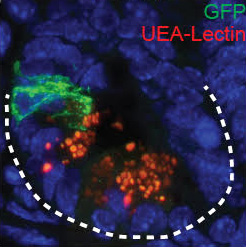The intestinal epithelium is the tissue with the highest cell turnover rate. 100’s of millions of cells are generated everyday in the intestine yet all these cells die in less than a week. This tremendous regenerative power is sustained by a population of intestinal stem cells (ISCs). It was believed that ISCs represent an homogeneous population of rapidly dividing cells. In this work we reveal that ISCs adopt two discrete states, one of then defined by the expression of the RNA binding protein Mex3a and characterized by a slow proliferation mode. These slow cycling ISCs contribute to all intestinal lineages with a delayed kinetics. During homeostasis, Mex3a+ cells continually shift into the rapidly dividing, self-renewing ISC pool. Chemotherapy and radiation preferentially target rapidly dividing ISCs but spare the Mex3a+ cell population, which regenerates the intestinal epithelium following this toxic insult. Thus, Mex3a marks a reserve-like stem cell population within the intestinal epithelium.
Reference

